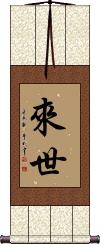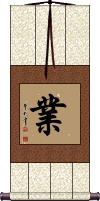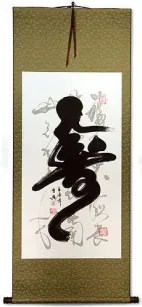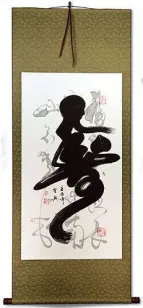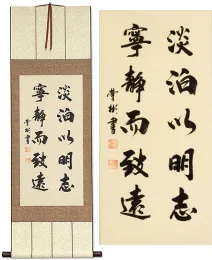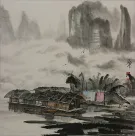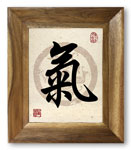Many custom options...
And formats...

Future Life in Chinese / Japanese...
Buy a Future Life calligraphy wall scroll here!
Personalize your custom “Future Life” project by clicking the button next to your favorite “Future Life” title below...
Eternal Life / Future Life
來世 is a word that can be used in many different ways.
It is often used to express the next life (life in heaven or wherever your soul is bound for). So it does have a religious overtone. However, it can also be used to express your life in the future - perhaps during your present lifetime.
It can also be translated as “the next world,” “the next generation,” “the time that is to come,” “otherworld,” or simply “posterity.”
See Also: Eternity | Rebirth | Reincarnation | Immortality
Choose Life
選擇生活 can mean to choose life instead of death (or suicide) or to choose to live life to the fullest.
I think of it as the key phrase used by Renton (Ewan McGregor) in the movie Trainspotting. While Chinese people will not think of Trainspotting when they see this phrase, for me, it will always be what comes near the end of this colorful rant:
Choose life. Choose a job. Choose a career. Choose a family. Choose a fucking big television. Choose washing machines, cars, compact disc players, and electrical tin can openers. Choose good health, low cholesterol, and dental insurance. Choose fixed-interest mortgage repayments. Choose a starter home. Choose your friends. Choose leisure wear and matching luggage. Choose a three-piece suite on-hire purchase in a range of fucking fabrics. Choose DIY and wondering who the fuck you are on a Sunday morning. Choose sitting on that couch watching mind-numbing, spirit-crushing game shows, stuffing fucking junk food into your mouth. Choose rotting away at the end of it all, pissing your last in a miserable home, nothing more than an embarrassment to the selfish, fucked-up brats you have spawned to replace yourself. Choose your future. Choose life.
Karma
Single character for Buddhist Karma
This is the simplest way to express the idea of Karma. This is the Buddhist concept of actions committed in a former life affecting the present and future.
Out of the context of Buddhism, this Karma character means one's profession in life, trade, occupation, business, study, or career.
The Karma definition applies to both Chinese and Japanese for this character. This also works as Korean Hanja as Karma; although the meaning can vary depending on context (my Korean dictionary gives the definition of profession/occupation).
See Also: Buddhism
Better Late Than Never
It's Never Too Late Too Mend
Long ago in what is now China, there were many kingdoms throughout the land. This time period is known as “The Warring States Period” by historians because these kingdoms often did not get along with each other.
Sometime around 279 B.C. the Kingdom of Chu was a large but not particularly powerful kingdom. Part of the reason it lacked power was the fact that the King was surrounded by “yes men” who told him only what he wanted to hear. Many of the King's court officials were corrupt and incompetent which did not help the situation.
The King was not blameless himself, as he started spending much of his time being entertained by his many concubines.
One of the King's ministers, Zhuang Xin, saw problems on the horizon for the Kingdom, and warned the King, “Your Majesty, you are surrounded by people who tell you what you want to hear. They tell you things to make you happy and cause you to ignore important state affairs. If this is allowed to continue, the Kingdom of Chu will surely perish, and fall into ruins.”
This enraged the King who scolded Zhuang Xin for insulting the country and accused him of trying to create resentment among the people. Zhuang Xin explained, “I dare not curse the Kingdom of Chu but I feel that we face great danger in the future because of the current situation.” The King was simply not impressed with Zhuang Xin's words.
Seeing the King's displeasure with him and the King's fondness for his court of corrupt officials, Zhuang Xin asked permission from the King that he may take leave of the Kingdom of Chu, and travel to the State of Zhao to live. The King agreed, and Zhuang Xin left the Kingdom of Chu, perhaps forever.
Five months later, troops from the neighboring Kingdom of Qin invaded Chu, taking a huge tract of land. The King of Chu went into exile, and it appeared that soon, the Kingdom of Chu would no longer exist.
The King of Chu remembered the words of Zhuang Xin and sent some of his men to find him. Immediately, Zhuang Xin returned to meet the King. The first question asked by the King was “What can I do now?”
Zhuang Xin told the King this story:
A shepherd woke one morning to find a sheep missing. Looking at the pen saw a hole in the fence where a wolf had come through to steal one of his sheep. His friends told him that he had best fix the hole at once. But the Shepherd thought since the sheep is already gone, there is no use fixing the hole.
The next morning, another sheep was missing. And the Shepherd realized that he must mend the fence at once. Zhuang Xin then went on to make suggestions about what could be done to reclaim the land lost to the Kingdom of Qin, and reclaim the former glory and integrity of the Kingdom of Chu.
The Chinese idiom shown above came from this reply from Zhuang Xin to the King of Chu almost 2,300 years ago.
It translates roughly into English as...
“Even if you have lost some sheep, it's never too late to mend the fence.”
This proverb, 亡羊补牢犹未为晚, is often used in modern China when suggesting in a hopeful way that someone change their ways, or fix something in their life. It might be used to suggest fixing a marriage, quitting smoking, or getting back on track after taking an unfortunate path in life among other things one might fix in their life.
I suppose in the same way that we might say, “Today is the first day of the rest of your life” in our western cultures to suggest that you can always start anew.
Note: This does have Korean pronunciation but is not a well-known proverb in Korean (only Koreans familiar with ancient Chinese history would know it). Best if your audience is Chinese.
This in-stock artwork might be what you are looking for, and ships right away...
Gallery Price: $61.00
Your Price: $33.88
Gallery Price: $61.00
Your Price: $33.88
Gallery Price: $61.00
Your Price: $33.88
Gallery Price: $61.00
Your Price: $33.88
Longevity / Long Life Unique Calligraphy Scroll
Discounted Blemished
Gallery Price: $47.00
Your Price: $26.00
Gallery Price: $61.00
Your Price: $33.88
Gallery Price: $31.00
Your Price: $16.88
Decorative Longevity / Long Life Calligraphy Wall Scroll
Discounted Blemished
Gallery Price: $31.00
Your Price: $17.00
Gallery Price: $198.00
Your Price: $109.88
Decorative Friends At Sunset Of Life
Chinese Proverb Art
Discounted Blemished
Gallery Price: $61.00
Your Price: $33.88
Gallery Price: $61.00
Your Price: $33.88
Gallery Price: $61.00
Your Price: $33.88
Gallery Price: $90.00
Your Price: $35.00
Not the results for future life that you were looking for?
Below are some entries from our dictionary that may match your future life search...
| Characters If shown, 2nd row is Simp. Chinese |
Pronunciation Romanization |
Simple Dictionary Definition |
來世 来世 see styles |
lái shì lai2 shi4 lai shih raise |
More info & calligraphy: Eternal Life / Future LifeFuture world, or rebirth. |
三生 see styles |
sān shēng san1 sheng1 san sheng mitsuo みつお |
(surname, given name) Mitsuo The three births, or reincarnations, past, present, future. Tiantai has (a) 種 planting the seed; (b) 熟 ripening; (c) 脫 liberating, stripping, or harvesting, i.e. beginning, development, and reward of bodhi, a process either gradual or instantaneous. Huayan has (a) 見聞生 a past life of seeing and hearing Buddha-truth; (b) 解行生 liberation in the present life; (c) 證入生 realization of life in Buddhahood. This is also called 三生成佛, Buddhahood in the course of three lives. There is also a definition of three rebirths as the shortest term for arhatship, sixty kalpas being the longest. There are other definitions. |
下世 see styles |
xià shì xia4 shi4 hsia shih shimoyo しもよ |
to die; future incarnation; next life; to be born; to come into the world; future generation (surname) Shimoyo |
不善 see styles |
bù shàn bu4 shan4 pu shan fuzen ふぜん |
bad; ill; not good at; not to be pooh-poohed; quite impressive evil; sin; vice; mischief Not good; contrary to the right and harmful to present and future life, e. g. 五逆十惡. |
二世 see styles |
èr shì er4 shi4 erh shih futase ふたせ |
the Second (of numbered kings); second generation (e.g. Chinese Americans) {Buddh} two existences; the present and the future; (female given name) Futase This life and the hereafter. |
來生 来生 see styles |
lái shēng lai2 sheng1 lai sheng rai らい |
next life (female given name) Rai Future rebirth; the future life. |
利樂 利乐 see styles |
lì lè li4 le4 li le riraku |
Blessing and joy; the blessing being for the future life, the joy for the present; or aid (for salvation) and the joy of it. |
十智 see styles |
shí zhì shi2 zhi4 shih chih jū chi |
The ten forms of understanding. I. Hīnayāna: (1) 世俗智 common understanding; (2) 法智 enlightened understanding, i.e. on the Four Truths in this life; (3) 類智 ditto, applied to the two upper realms 上二界; (4), (5), (6), (7) understanding re each of the Four Truths separately, both in the upper and lower realms, e.g. 苦智; (8) 他心智 understanding of the minds of others; (9) 盡智 the understanding that puts an end to all previous faith in or for self, i.e. 自信智; (10) 無生智 nirvāṇa wisdom; v. 倶舍論 26. II. Mahāyāna. A Tathāgatas ten powers of understanding or wisdom: (1) 三世智 perfect understanding of past, present, and future; (2) ditto of Buddha Law; (3) 法界無礙智 unimpeded understanding of the whole Buddha-realm; (4) 法界無邊智 unlimited, or infinite understanding of the whole Buddha-realm; (5) 充滿一切智 understanding of ubiquity; (6) 普照一切世間智 understanding of universal enlightenment; (7) 住持一切世界智 understanding of omnipotence, or universal control; (8) 知一切衆生智 understanding of omniscience re all living beings; (9) 知一切法智 understanding of omniscience re the laws of universal salvation; (10) 知無邊諸佛智 understanding of omniscience re all Buddha wisdom. v. 華嚴経 16. There are also his ten forms of understanding of the "Five Seas" 五海 of worlds, living beings, karma, passions, and Buddhas. |
受者 see styles |
shòu zhě shou4 zhe3 shou che jusha |
A recipient (e. g. of the rules). The illusory view that the ego will receive reward or punishment in a future life, one of the sixteen false views. |
四執 四执 see styles |
sì zhí si4 zhi2 ssu chih shishū |
The four erroneous tenets; also 四邪; 四迷; 四術; there are two groups: I. The four of the 外道 outsiders, or non-Buddhists, i. e. of Brahminism, concerning the law of cause and effect: (1) 邪因邪果 heretical theory of causation, e. g. creation by Mahesvara; (2) 無因有果 or 自然, effect independent of cause, e. g. creation without a cause, or spontaneous generation; (3) 有因無果 cause without effect, e. g. no future life as the result of this. (4) 無因無果 neither cause nor effect, e. g. that rewards and punishments are independent of morals. II. The four erroneous tenets of 內外道 insiders and outsiders, Buddhist and Brahman, also styled 四宗 the four schools, as negated in the 中論 Mādhyamika śāstra: (1) outsiders, who do not accept either the 人 ren or 法 fa ideas of 空 kong; (2) insiders who hold the Abhidharma or Sarvāstivādāḥ tenet, which recognizes 人空 human impersonality, but not 法空 the unreality of things; (3) also those who hold the 成實 Satyasiddhi tenet which discriminates the two meanings of 空 kong but not clearly; and also (4) those in Mahāyāna who hold the tenet of the realists. |
四衆 四众 see styles |
sì zhòng si4 zhong4 ssu chung shishu; shishuu / shishu; shishu ししゅ; ししゅう |
(1) four orders of Buddhist followers (monks, nuns, male lay devotees and female lay devotees); (2) four monastic communities (ordained monks, ordained nuns, male novices and female novices); (3) (in Tendai) the four assemblies The four varga (groups, or orders), i. e. bhikṣu, bhikṣuṇī, upāsaka and upāsikā, monks, nuns, male and female devotees. Another group, according to Tiantai's commentary on the Lotus, is 發起衆 the assembly which, through Śāriputra, stirred the Buddha to begin his Lotus Sutra sermons; 當機衆 the pivotal assembly, those who were responsive to him; 影向衆 the reflection assembly, those like Mañjuśrī, etc., who reflected on, or drew out the Buddha's teaching; and 結緣衆 those who only profited in having seen and heard a Buddha, and therefore whose enlightenment is delayed to a future life. |
往生 see styles |
wǎng shēng wang3 sheng1 wang sheng oujou / ojo おうじょう |
to be reborn; to live in paradise (Buddhism); to die; (after) one's death (n,vs,vi) (1) {Buddh} passing on to the next life; (n,vs,vi) (2) death; (n,vs,vi) (3) giving up a struggle; submission; (n,vs,vi) (4) being at one's wits' end; being flummoxed; (5) (rare) (See 圧状・2) coercion The future life, the life to which anyone is going; to go to be born in the Pure Land of Amitābha. (1) 往相囘向 To transfer one's merits to all beings that they may attain the Pure Land of Amitābha. (2) 還相囘向 Having been born in the Pure Land to return to mortality and by one's merits to bring mortals to the Pure Land. |
斷送 断送 see styles |
duàn sòng duan4 song4 tuan sung |
to forfeit (future profit, one's life etc); ruined |
未來 未来 see styles |
wèi lái wei4 lai2 wei lai mirai みらい |
future; tomorrow; CL:個|个[ge4]; approaching; coming; pending (female given name) Mirai 當來 anāgata; that which has not come, or will come; the future, e. g. 未來世 a future life, or lives; also the future tense, one of the 三世, i. e. 過, 現, 未 past, present, future. |
業田 业田 see styles |
yè tián ye4 tian2 yeh t`ien yeh tien gouda / goda ごうだ |
(surname) Gouda The field of karma; the life in which the seeds of future harvest are sown. |
無期 无期 see styles |
wú qī wu2 qi1 wu ch`i wu chi muki むき |
unspecified period; in the indefinite future; no fixed time; indefinite sentence (i.e. life imprisonment) (adj-no,n) (1) (ant: 有期) indefinite; unlimited; (2) (abbreviation) (See 無期懲役) life imprisonment |
當來 当来 see styles |
dāng lái dang1 lai2 tang lai tōrai |
That which is to come, the future, the future life, etc. |
見正 见正 see styles |
jiàn zhèng jian4 zheng4 chien cheng mishou / misho みしょう |
(surname) Mishou Seeing correctly; said to be the name of a disciple of the Buddha who doubted a future life, to whom the Buddha is said to have delivered the contents of the 見正經. |
三時業 三时业 see styles |
sān shí yè san1 shi2 ye4 san shih yeh sanjigou / sanjigo さんじごう |
{Buddh} (See 順現業,順次業,順後業) karmic retribution through the past, present, and future; three types of karma The three stages of karma— in the present life because of present deeds; in the next life because of present actions; and in future lives because of present actions. |
將來世 将来世 see styles |
jiāng lái shì jiang1 lai2 shi4 chiang lai shih shōrai se |
in a future life |
後の世 see styles |
nochinoyo のちのよ |
after ages; posterity; future life; the next world |
未來有 未来有 see styles |
wèi lái yǒu wei4 lai2 you3 wei lai yu mirai u |
future life |
活神仙 see styles |
huó shén xiān huo2 shen2 xian1 huo shen hsien |
a god living in our midst (sb who can predict the future like a prophet or who leads a life without constraints) |
身の上 see styles |
minoue / minoe みのうえ |
(exp,n) (1) one's station in life; one's personal history; one's circumstances; (exp,n) (2) one's lot; one's destiny; one's future |
一九之生 see styles |
yī jiǔ zhī shēng yi1 jiu3 zhi1 sheng1 i chiu chih sheng ikku no shō |
Future life in the Amitābha Pure Land. |
九品往生 see styles |
jiǔ pǐn wǎng shēng jiu3 pin3 wang3 sheng1 chiu p`in wang sheng chiu pin wang sheng kuhon ōjō |
The ninefold future life, in the Pure Land, v. 九品淨土. It is detailed in the sutra of this name whose full title is 阿彌陀三摩地集陀羅尼經. |
二種因果 二种因果 see styles |
èr zhǒng yīn guǒ er4 zhong3 yin1 guo3 erh chung yin kuo nishuinka |
Two aspects of cause and effect, a division of the 四諦 "four noble truths" (a) 世間因果 in the present life, the 苦諦 being the effect, and the 集諦 the cause; (b) 出世間因果 in the future life, the 滅諦, extinction (of passion, or mortality) being the fruit, and the 道諦 the " eightfold noble path " the cause. |
十二因緣 十二因缘 see styles |
shí èr yīn yuán shi2 er4 yin1 yuan2 shih erh yin yüan jūni innen |
Dvādaśaṅga pratītyasamutpāda; the twelve nidānas; v. 尼 and 因; also 十二緣起; 因緣有支; 因緣率連; 因緣棘園; 因緣輪; 因緣重城; 因緣觀; 支佛觀. They are the twelve links in the chain of existence: (1) 無明avidyā, ignorance, or unenlightenment; (2) 行 saṃskāra, action, activity, conception, "dispositions," Keith; (3) 識 vijñāna, consciousness; (4) 名色 nāmarūpa, name and form; (5) 六入 ṣaḍāyatana, the six sense organs, i.e. eye, ear, nose, tongue, body, and mind; (6) 觸 sparśa, contact, touch; (7) 受 vedanā, sensation, feeling; (8) 愛 tṛṣṇā, thirst, desire, craving; (9) 取 upādāna, laying hold of, grasping; (10) 有 bhava, being, existing; (11) 生 jāti, birth; (12) 老死 jarāmaraṇa, old age, death. The "classical formula" reads "By reason of ignorance dispositions; by reason of dispositions consciousness", etc. A further application of the twelve nidānas is made in regard to their causaton of rebirth: (1) ignorance, as inherited passion from the beginningless past ; (2) karma, good and evil, of past lives; (3) conception as a form of perception; (4) nāmarūpa, or body and mind evolving (in the womb); (5) the six organs on the verge of birth; (6) childhood whose intelligence is limited to sparśa, contact or touch; (7) receptivity or budding intelligence and discrimination from 6 or 7 years; (8) thirst, desire, or love, age of puberty; (9) the urge of sensuous existence; (10) forming the substance, bhava, of future karma; (11) the completed karma ready for rebirth; (12) old age and death. The two first are associated with the previous life, the other ten with the present. The theory is equally applicable to all realms of reincarnation. The twelve links are also represented in a chart, at the centre of which are the serpent (anger), boar (ignorance, or stupidity), and dove (lust) representing the fundamental sins. Each catches the other by the tail, typifying the train of sins producing the wheel of life. In another circle the twelve links are represented as follows: (1) ignorance, a blind woman; (2) action, a potter at work, or man gathering fruit; (3) consciousness, a restless monkey; (4) name and form, a boat; (5) sense organs, a house; (6) contact, a man and woman sitting together; (7) sensation, a man pierced by an arrow; (8) desire, a man drinking wine; (9) craving, a couple in union; (10) existence through childbirth; (11) birth, a man carrying a corpse; (12) disease, old age, death, an old woman leaning on a stick. v. 十二因緣論 Pratītya-samutpāda śāstra. |
於當來世 于当来世 see styles |
yú dāng lái shì yu2 dang1 lai2 shi4 yü tang lai shih o tōrai se |
a future life |
生活不安 see styles |
seikatsufuan / sekatsufuan せいかつふあん |
worry (uncertainty, uneasiness, insecurity) about one's life (future) |
Click here for more future life results from our dictionary
The following table may be helpful for those studying Chinese or Japanese...
| Title | Characters | Romaji (Romanized Japanese) | Various forms of Romanized Chinese | |
| Eternal Life Future Life | 來世 来世 | rai-se | lái shì / lai2 shi4 / lai shi / laishi | lai shih / laishih |
| Choose Life | 選擇生活 选择生活 | xuǎn zé shēng huó xuan3 ze2 sheng1 huo2 xuan ze sheng huo xuanzeshenghuo | hsüan tse sheng huo hsüantseshenghuo |
|
| Karma | 業 业 | gou / go | yè / ye4 / ye | yeh |
| Better Late Than Never | 亡羊補牢猶未為晚 亡羊补牢犹未为晚 | wáng yáng bǔ láo yóu wèi wéi wǎn wang2 yang2 bu3 lao2 you2 wei4 wei2 wan3 wang yang bu lao you wei wei wan | wang yang pu lao yu wei wei wan wangyangpulaoyuweiweiwan |
|
| In some entries above you will see that characters have different versions above and below a line. In these cases, the characters above the line are Traditional Chinese, while the ones below are Simplified Chinese. | ||||
Successful Chinese Character and Japanese Kanji calligraphy searches within the last few hours...
